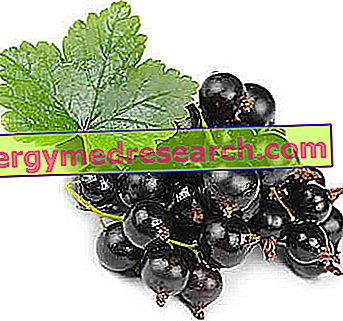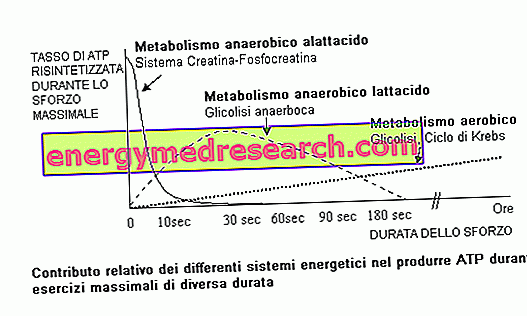See also: currant seed oil in cosmetics
Generality
Botany and description of blackcurrant
Black currant (botanical name Ribes nigrum ) is a spontaneous shrub, which prefers wooded, damp and shady places in the mountainous regions of Asia and central-northern Europe.

Blackcurrant seeds are used for the extraction of an oil which, as we will see, has appreciable nutritional characteristics; the same is not true for its gustatory qualities, which is why it is largely destined for the cosmetic industry.
The leaves are also used as a herbal herbal remedy (for the characteristics that we will list later) and constitute the raw material of extraction for a yellow dye.
Indications
When to use blackcurrant?
Fruits of black currant
Blackcurrant fruits are a real mine of antioxidants, useful for:
- Slow down the aging process
- Protect against metabolic disorders
- Obstructing diseases related to oxidative stress (cancer prevention)
- Favor diuresis to combat water retention, cellulite, etc.
- To combat diarrhea
- To reduce sensitivity to environmental allergens.
Some suggest black currant as a nutraceutical adjuvant in the treatment of Alzheimer's disease.
Blackcurrant seed and oil seeds
Blackcurrant seed oil is widely used by the female population; this is because it is believed that symptoms may diminish:
- of menopause
- premenstrual syndrome and especially breast pain.
More generally, blackcurrant is also considered an immuno-modulator and a metabolic protector; as such, it is recommended in case of:
- Inflammatory disorders (rheumatoid arthritis etc.)
- Metabolic diseases (high cholesterol, high blood pressure, high triglycerides) and more.
Blackcurrant leaves
In the field of herbal medicine, blackcurrant leaves are used as a precious complement to:
- Improve the response to psychophysical stress
- Counteract gout, rheumatism and other joint disorders
- Combat infections of the oral cavity and respiratory tract
- Reduce diarrhea
- Help the liver during infections or intoxications
- Reduce cystitis
- Topically, as a relief from insect bites.
Property and Effectiveness
What benefits has black currant shown during the studies?
Note : many properties attributable to the black currant in its entirety are instead attributable to the phytocomponents that characterize it. This difference, which may seem irrelevant, is instead significant when it is necessary to define a real and measurable level of effectiveness in the specific use.
The properties of black currant, common to all wild berries (raspberry, blueberry, blackberry, currant and gooseberry), are mainly attributable to the richness in vitamin C (ascorbic acid) and anthocyanosides.
Anthocyanosides of blackcurrant
Anthocyanosides are water-soluble pigments belonging to the flavonoid family; the most common in blackcurrant pulp are:
- delphinidin-3-O-glucoside (mirtillin)
- delphinidin-3-O-rutinoside (tulipanine)
- cyanidin-3-O-glucoside (crisantemina)
- cyanidin-3-O-rutinoside (antirrinina).
On the other hand, there are many other unidentified polyphenols in the black currant.
Vitamin C and anthocyanosides
The association between anthocyanosides and vitamin C exerts a series of very important functions, including:
- Antioxidant, protecting the body from free radicals
- Anti-aging
- Anticancer, as a preventive agent
- Anti-inflammatory
- Antiplatelet agent, with positive repercussions on the health of the entire cardiovascular system
- Invigorating for the microcirculation, in opposition to the problems of fragility and excessive capillary permeability. This brings significant benefits in the event of:
- Cellulite
- varices
- Swollen legs and feet
- Water retention
- Venous insufficiency
- Hemorrhoids.
- Improvement of visual acuity.
Other properties of blackcurrant fruits
More generally, the fruits of black currant, widely used in the formulation of herbal teas, enjoy the following properties:
- diuretic
- cleansing
- allergy
- The astringent.
Blackcurrant seed and oil seeds
The seeds yield an oil that is particularly rich in vitamin E (alpha-tocopherol) and essential fatty acids (10-15%), with an excellent balance between gamma-linolenic acid (omega 6) and alpha linolenic acid (omega 3); for this reason it is considered to have ownership:
- Anti inflammatory
- Ipotrigliceridemiche
- hypotensive
- Hypocholesterolemics (reduces LDL and improves HDL percentage).
Nutritional Characteristics of Blackcurrant Fruits
| Raw blackcurrant pulp | |||
| Nutritional values per 100 g | |||
| Power | 63 kcal | ||
| Total carbohydrates | 15.4 g | ||
| Simple sugars | 15.4 g | ||
| Grassi | 0.4 g | ||
| Protein | 1.4 g | ||
| fibers | 3.3 g | ||
| water | 82.0 g | ||
| Vitamins | |||
| Thiamine or B1 | 0.05 mg | 4% | |
| Riboflavin or B2 | 0.05 mg | 4% | |
| Niacin or PP or B3 | 0.3 mg | 2% | |
| Pantothenic acid or B5 | 0.398 mg | 8% | |
| Pyridoxine or B6 | 0.066 mg | 5% | |
| Folic acid | - μg | -% | |
| Choline | - mg | -% | |
| Ascorbic acid or C | 181.0 mg | 218% | |
| Alpha-tocopherol or E | 1.0 mg | 7% | |
| Minerals | |||
| Football | 55 mg | 6% | |
| Iron | 1.54 mg | 12% | |
| Magnesium | 24.0 mg | 7% | |
| Manganese | 0.256 mg | 12% | |
| Phosphorus | 59.0 mg | 8% | |
| Potassium | 322.0 mg | 7% | |
| Sodium | 2.0 mg | 0% | |
| Zinc | 0.27 mg | 3% | |
Doses and Mode of Use
How to use blackcurrant?
The appropriate dose of blackcurrant as a treatment, in any form, depends on several factors, such as:
- Age
- Health state
- Pathological or para-physiological conditions.
At the moment it is not possible to establish a universal dosage for any blackcurrant-based product, which must therefore be taken according to the instructions of the manufacturer and / or treating physician.
Side effects
As a food (fruit and seed oil), blackcurrant is considered to be safe.
However, not enough information is available to accurately assess the safety margin for high doses referred to extracts (in general) and herbal remedies based on leaves.
Contraindications
When should blackcurrant not be used?
- No adequate data are known to evaluate the safety margin of blackcurrant-based products on pregnant women and nurses. Therefore, in this case, we do not recommend taking any blackcurrant-based product, with the exception of food (fruits).
- It is hypothesized that it may slow down clotting by increasing the risk of bleeding and bruising in people with bleeding disorders, who should therefore avoid taking large quantities of this product.
- For the same reason, it is advisable to stop taking black currants two weeks before surgery.
- Blackcurrant can lower blood pressure and therefore, theoretically, worsen hypotension in susceptible individuals, which should avoid this product.
Pharmacological Interactions
Which drugs or foods can change the effect of blackcurrant?
There are no known drugs that can chemically interact with blackcurrant or its derivatives.
Precautions for Use
What do you need to know before taking blackcurrant?
Natural products should not be considered "necessarily safe"; therefore, it is advisable to follow the instructions on the label and consult your pharmacist, doctor or other healthcare professional before using them.



